Pellets and flakes are available commercial feeds for bettas in the hobby. But as a betta owner, have you ever wondered which is better; are pellets or flakes better for bettas?
Pellets are better than flakes because they usually contain a higher crude protein content, a major nutritional need for your betta. Pellets are also less messy than flakes; they do not dissolve rapidly to disrupt your water parameters or sink to cause debris build-up at the base of your aquarium.
But there is more to why pellets are better than flakes for bettas. Keep reading to see why pellets are a better choice for your bettas.
You will also learn how to avoid common mistakes hobbyists make when feeding pellets and the best way to feed pellets to your bettas.
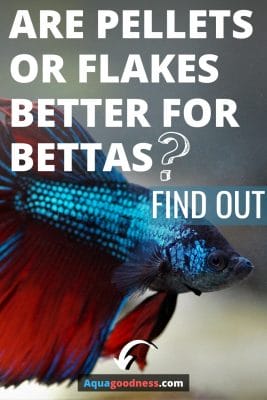
Table of Contents
Why Are Pellets Better Than Flakes for Bettas?
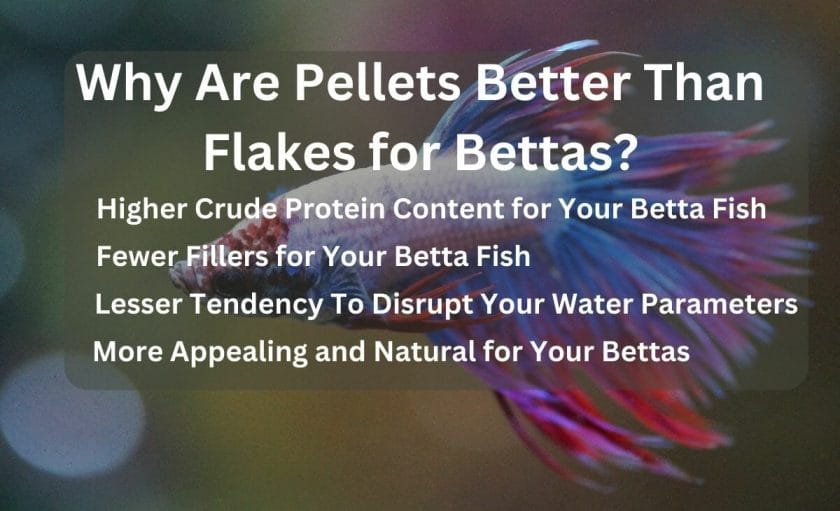
Below are some of the most important reasons pellets are better than flakes for bettas.
Higher Crude Protein Content for Your Betta Fish
Pellets usually have a higher crude protein content than flakes. Pellets can have as much as 45% crude protein to satisfy the nutritional needs of your bettas since they are carnivores.
Many betta pellets have salmon or other fish as their primary ingredient. This is important to ensure a high level of crude protein for bettas.
On the other hand, flakes usually have a lesser crude protein content and contain a lot of plant matter. Hence, they do not supply enough crude protein for your bettas as pellets.
Fewer Fillers for Your Betta Fish
Flakes are usually formulated for omnivorous and herbivorous fish species. Flakes usually contain a lot of plant matter and fillers that do not hold much nutritional value for your Bettas.
Most flakes contain fillers such as groundnut oil cake, wheat bran, soybean meal, rice bran, etc.
Remember that bettas are carnivores and feed on high-protein foods in the wild. Some natural betta diets include insects, insect larvae, small crustaceans, and worms. So offering flakes to your Bettas is not a smart choice at all.
Pellets, on the other hand, usually contain less plant matter and fillers. They are formulated for carnivorous fish species and have almost no fillers in them.
Lesser Tendency To Disrupt Your Water Parameters
From experience, many hobbyists find that flakes are messier than pellets.
Uneaten flakes will usually sink to the bottom of the tank, stay there, and cause a build-up on your rock or substrate.
Over time, these build-ups will ultimately make your aquarium dirty, disrupt your water parameters, and lead to water pollution problems for your bettas.
At other times, they will rapidly dissolve, so if you feed too much or have too many flakes dissolve in your tank, you will face a pollution crisis.
Pellets, on the other hand, dissolve slower than flakes. This gives your bettas enough time to eat them all up.
Hence, the chances of pellets messing up your water parameters or polluting your aquarium are slim.
More Appealing and Natural for Your Bettas
Flakes typically look like debris when they appear on the surface of the aquarium. They hardly appear natural to Bettas.
You may notice that your bettas tend to ignore fish flakes whenever you feed them some. This is because flakes usually look like debris on the water’s surface.
But pellets look more natural and appealing to bettas. They sit on the surface of the water like insects. You may have noticed your bettas dashing at the pellets whenever you offer them some.
This is because in the wild, bettas dash at insects and their larvae on the water’s surface when they find some.
Pellets usually look like insects. Hence, bettas tend to prefer them and will dash at them as though they were insects.
Best Pellet Foods for Betta Fish
These are a couple of the best pellet food for your Betta fish.
Omega One Betta Buffet
Omega One Betta Buffet is one of the best fish foods you can feed your Betta fish. This is because it is made from high-quality ingredients.
Specifically, it contains whole ingredients and no meals in it which provide high-quality protein to your carnivore Betta fish.
This fish food contains high-quality meaty ingredients like salmon, whole herring, and whole shrimp, which fulfill the protein needs of your Betta fish.
Besides, it also contains Beta carotenes from salmon, along with Astaxanthin and Canthaxanthin, which help to improve the coloration of your Betta fish.
Overall, Omega One Betta Buffet is a great choice for Betta fish because it is made from high-quality ingredients and is affordable as well.
Check the latest price of this fish food at Amazon here
Hikari Betta Bio-Gold Baby Pellets
This fish food is very popular. And it comes from a reputed brand.
This is a floating pellet food that is specifically made for Betta fish.
It contains a good amount of meaty ingredients, like fish meal and krill meal. And overall, it contains around 38% crude protein, which is not a lot but is good enough for Betta fish.
Besides, it also has some color-enhancing ingredients like spirulina and duckweed which will help to improve the coloration of your Betta.
Actually, many people found that it’s a very good fish food, especially if you’re looking to improve the coloration of your Betta fish.
Though it contains meaty ingredients that can provide protein to your Betta. And color enhancing ingredients that will improve the coloration of your Betta, it also contains a lot of filler ingredients. Also, it contains meals instead of whole ingredients.
Overall, Hikari Betta Bio-Gold Baby Pellets is a good choice for you if you’re looking for a popular fish food from a reputed brand that can fulfill all the nutritional requirements of your Betta fish.
Check the latest price of this fish food at Amazon here
What Is the Best Way To Feed Pellets to Bettas?
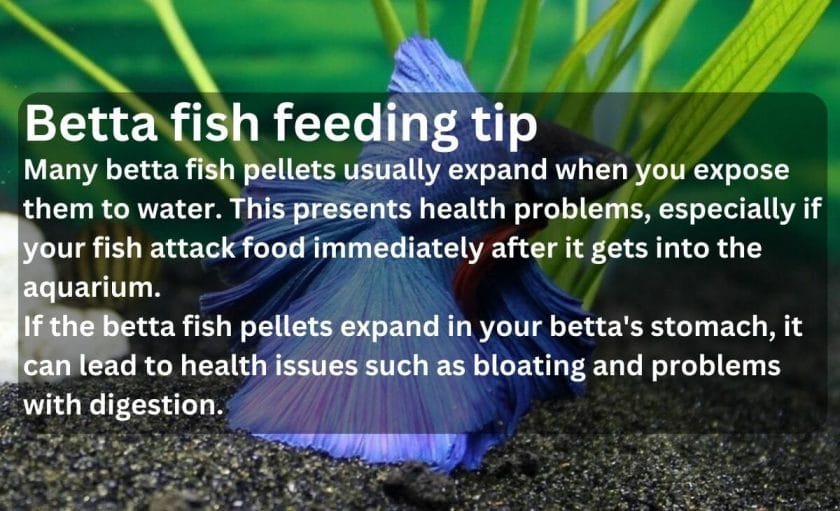
Knowing how to feed is equally as important as knowing what to feed. Many hobbyists make the mistake of dumping the pellets into the aquarium during feeding time. That is wrong and risky.
Presoaking Your Betta Pellets Before Feeding
Many betta fish pellets usually expand when you expose them to water. This presents health problems, especially if your fish attack food immediately after it gets into the aquarium.
If the betta fish pellets expand in your betta’s stomach, it can lead to health issues such as bloating and problems with digestion.
It would be best to check if the pellets expand by exposing some to water. If they expand significantly, you want to separate how many pellets you want to offer and soak them in some water before offering them to your bettas.
Feeding Frequency
For feeding frequency, you must always remember that bettas and most fish species never know when to stop eating. They will keep eating as long as you keep feeding, which presents the danger of overfeeding.
You want to feed only what your Betta fish can finish in a minute, depending on its size. Ideally, 2-4 pellets daily are best for juveniles.
You can feed as many as 8-12 pellets for older bettas. But you want to divide the meal into two parts and feed accordingly.
Supplement Their Diet
You also want to supplement their diet with other food choices, such as live and freeze-dried foods. Ensure they have a varied diet, including brine shrimp, tiny crustaceans, and worms. You can also feed them mosquito larvae.
Feed According to Their Ages
Younger Bettas tend to eat fewer pellets than older Bettas. But as your bettas grow older and begin to lose appetite, it would be best to decrease the number of pellets you feed them to avoid having pellets sink to the aquarium base and pollute the water chemistry.
Check the Ingredients of Your Betta Pellets
You also want to check the ingredients of the betta pellets. Ensure that the crude protein content is not less than 30% and that it contains good dried meat sources like krill, shrimp, and smaller fish. You will usually find this information on the packaging.
You want to pay attention to the brand of betta pellets you are feeding your bettas. Some manufacturers make sinking pellets. So you must ensure that the pellets you opt for do not sink but float.
Choose Pellet Size According to the Size of Your Betta Fish
Apart from buying floating betta pellets specifically, you want to ensure that the pellets are small enough for your fish to eat.
Some betta pellets may be labeled as small enough for juveniles. But they may be too much for your juvenile Bettas to swallow after they expand in the water.
You can always presoak them to make them easier for your betta to eat. But if they are too big for your bettas, choosing an alternative feed option with high protein content may be the best. You can choose blood worms or tiny crustaceans for your bettas.
What About Betta Fish Flakes? Good for Bettas?
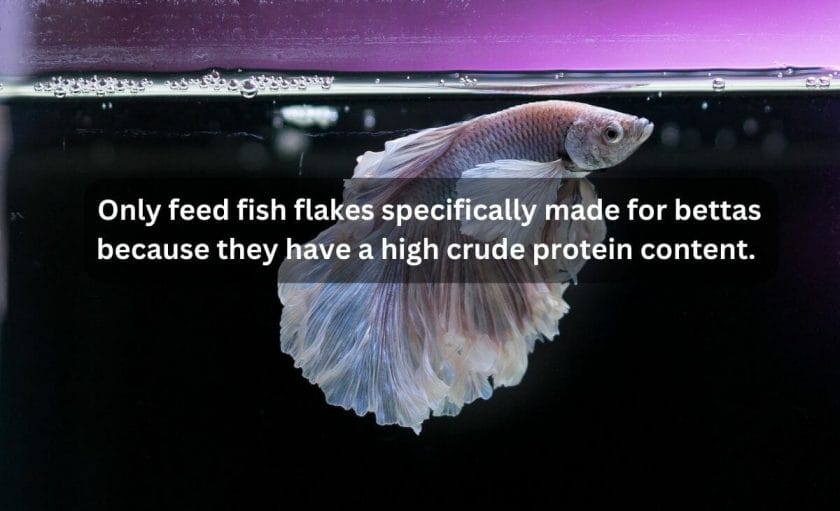
Although flakes usually have less crude protein content, some are specifically made for bettas and are designed to have a high crude protein content.
Most tropical fish flakes are good for bettas because they usually contain about 30% protein or more. Tropical fish flakes are typically formulated to have that much protein because they are formulated for tropical fish, which are mostly omnivores.
But you want to check the flakes’ packaging to be sure of the ingredients and the protein content level. If it falls below 30%, it would be best not to feed your Bettas with the flakes.
Best Flake Food for Betta Fish
This is the best flake food for your Betta fish.
TetraMin Plus Tropical Flakes
TetraMin Plus Tropical Flakes is a very good flake food option for your Betta fish because it is made from meaty ingredients. And overall, it contains 46% crude protein. It is also very cheap.
This is a tropical flake food, so as Betta fish are tropical fish, it is suitable for them. Many people have found that Betta fish really like this fish food. You can check customer reviews at Amazon here.
This fish food contains meaty ingredients such as fish meal and shrimp meal, which can provide protein to your Betta fish.
So, as you can see, this fish food contains meals instead of whole ingredients. Also, it contains a lot of fillers.
Overall, if you are looking for a popular and affordable flake food for your Betta fish, then TetraMin Plus Tropical Flakes is a good choice for you.
Check the latest price of this fish food at Amazon here
FAQ
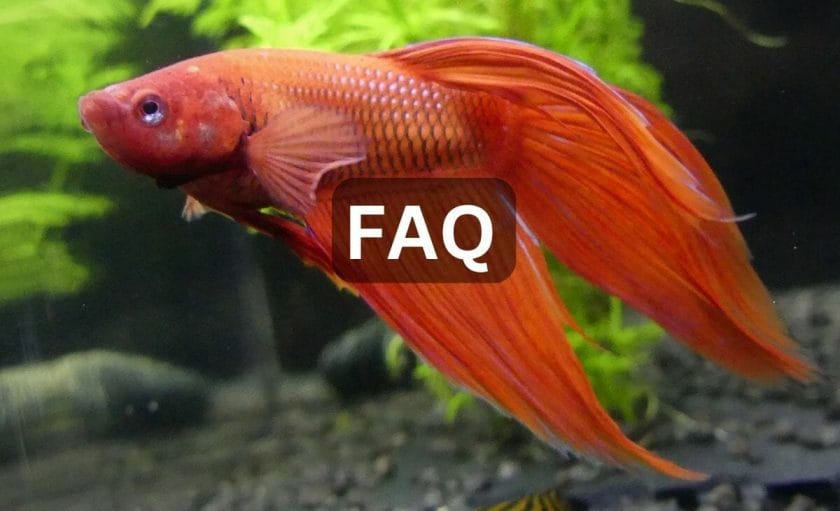
Can I Feed Bettas Only Pellets and Betta Fish Flakes?
No. Bettas need a varied and balanced diet to maintain their vibrant colors and stay immune to diseases.
You need to feed other foods such as tiny crustaceans such as brine shrimp and Mysis shrimp, bloodworms, insects, and insect larvae for your bettas to have a varied, balanced diet.
Why Is My Betta Not Eating Pellets?
Depending on the personality, some bettas may not find pellets appealing. They will often reject it if this is the case with your bettas.
Another possible reason is that your fish is overfed. So if it rejects the pellets, take them out and cut down on your feeding to prevent health issues caused by overfeeding.
What Fish Food Do Bettas Prefer the Most?
Bettas love live foods. Feeding live foods such as insects, worms, brine shrimp, and insect larvae can stimulate the predatory instincts in your bettas and supply them with crude protein.
But you can always offer pellets also since they contain crude protein sources and other vital minerals and vitamins.
How Long Should I Soak the Pellets Before Feeding Bettas?
You can soak the pellets in the tank water for about 30 seconds to a minute before feeding them to your bettas.
You want to hydrate the pellets in a separate container with some tank water before dumping it in your aquarium. And you mustn’t soak it for more than a minute.
Conclusion
Pellets are a better feed option for your bettas than flakes.
Bettas usually find pellets more appealing than flakes. Also, pellets offer a higher protein content to your bettas, which they need as carnivorous fish species.
Do not forget the four main reasons pellets are better than flakes for your Bettas. You also want to consider the six concerns discussed above when feeding your bettas.


